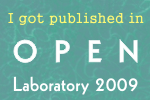Announcing CAFA 2: The Second Critical Assessment of protein Function Annotations Friends and Colleagues, We are pleased to announce the Second Critical Assessment of protein Function Annotation (CAFA) challenge. In CAFA 2, we would like to evaluate the performance of protein function prediction tools/methods (in old and new scenarios) and also expand the challenge to […]
The Uncanny Valley Every day, software appears to do more things that we thought were exclusively in the human realm. Like beating a grandmaster in chess, or carrying out a conversation. I say “appears” because there is obviously no self-aware intelligence involved, as this rather bizarre conversation between Cleverbots demonstrates. For humans, playing chess and carrying […]
I just received an email from Julian Gough , one of last year’s CAFA participants. He started a Wikipedia initiative on protein function prediction, which are barely stubs at the moment. EDIT: He alerted me to the fact that protein function prediction has virtually no presence on Wikipedia. So all you protein function predictors out there, please contribute. Yes, […]
Nearly a year ago, I posted about the Critical Assessment of Function prediction with which I am involved. The original post from July 22, 2010 is in the block quote. After that, an update about the meeting which will be held in exactly 2 weeks. The trouble with genomic sequencing, is that it is too […]
Last July I introduced CAFA: Critical Assessment of (Gene and Protein) Function Annotations. Recap: the number of genomic and metagenomic sequences is growing at a horrendous rate. We are inundated with sequence data, yet the fraction of useful information we can glean from these sequences is steadily decreasing. There are simply too many sequences, and they are […]
The trouble with genomic sequencing, is that it is too cheap. Anyone that has a bit of extra cash laying around, you can scrape the bugs off your windshield, sequence them, and write a paper. Seriously? Yes, seriously now: as we sequence more and more genomes, our annotation tools cannot keep up with them. It’s […]
I recently received an email from a graduate student in Philosophy regarding protein function. Not sure if that person wants his name advertised, so I will keep it to myself. “I am a fan of your blog, and interested in the philosophy of biology. One particularly interesting question is what makes something have a function; […]
Combrex is an exciting new project at Boston University to bridge computational and experimental techniques to functionally annotate proteins. They are hiring, see below: JOB POST We are seeking to hire a creative computational scientist for a transformative project: COMBREX: A Computational Bridge to Experiments. The work will involve building a novel resource that combines […]
Sequencing centers keep pumping large amounts of sequence data into the omics-sphere (will I get a New Worst omics Word Award for this?) There is no way we can annotate even a small fraction of those experimentally and indeed most annotations are automatic, done bioinformatically. Typically function is inferred by homology: if the protein sequence […]
Proteins are the machinery of life, and they facilitate most of life’s functions. Traffic into and out of the cell? Protein pumps, pores and channels. Respiration? Proteins. Metabolism and catabolism? Proteins. Immune system, signaling, development… all complex networks of interacting proteins. Understanding a protein’s structure can tell us a lot about how it performs its […]
A short follow up to the previous post on latherin. A quick reminder: latherin is a protein that exists in the horse’s sweat and saliva. In the sweat, latherin acts like a detergent, wetting the horse’s coat to allow for better water evaporation and hence better cooling. In the saliva, it helps wet the horse’s […]
Dennis Mitchell: “Margaret, you are all sweaty” Margaret Wade: “Dennis, girls don’t sweat. Horses sweat, boys perspire and girls glow” Dennis Mitchell: “Margaret, you are glowing like a horse”. — Dennis the Menace / Hank Ketcham Horses and humans sweat but most other mammals do not. Sweating lowers the body’s surface temperature by evaporating […]





